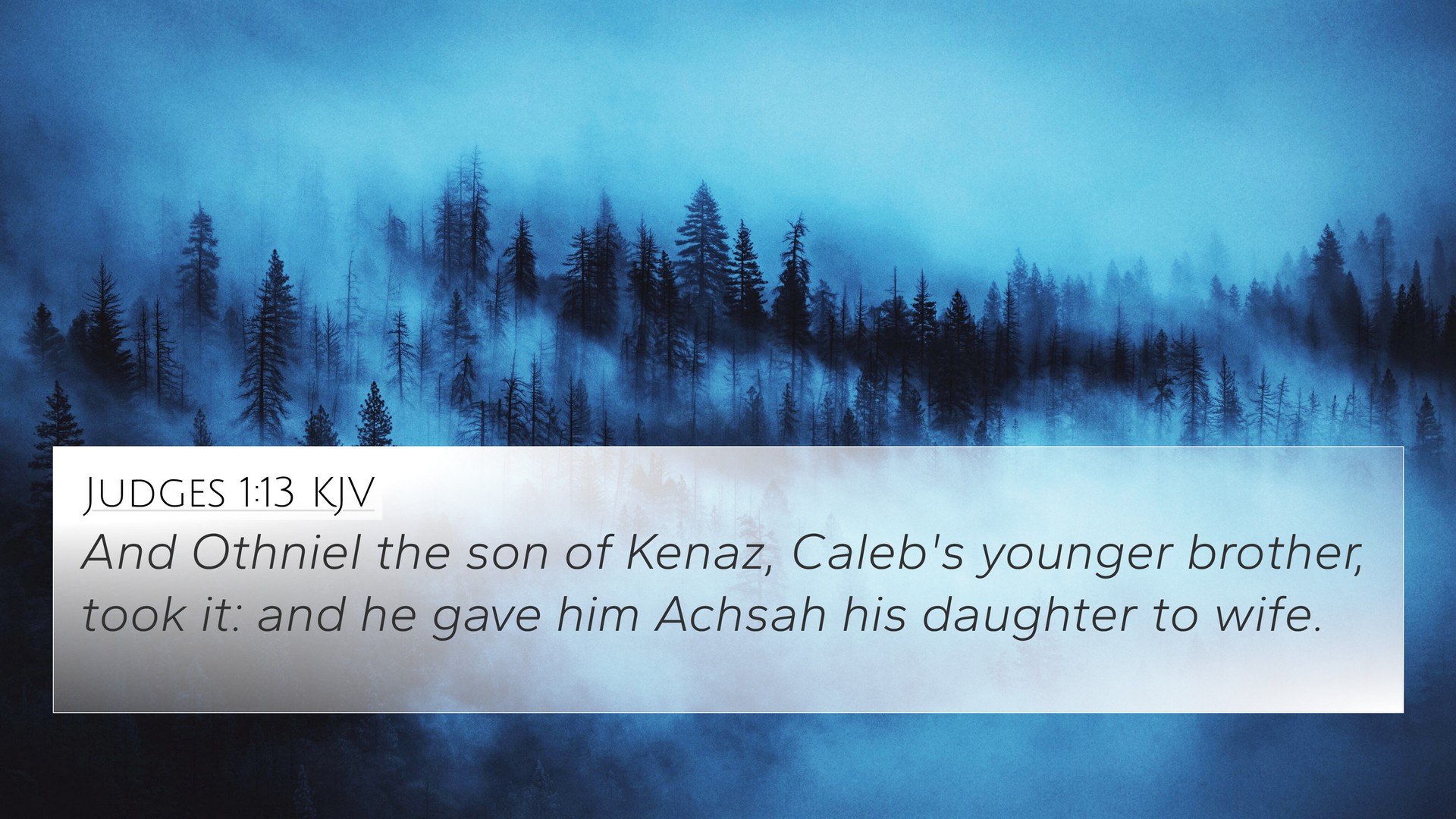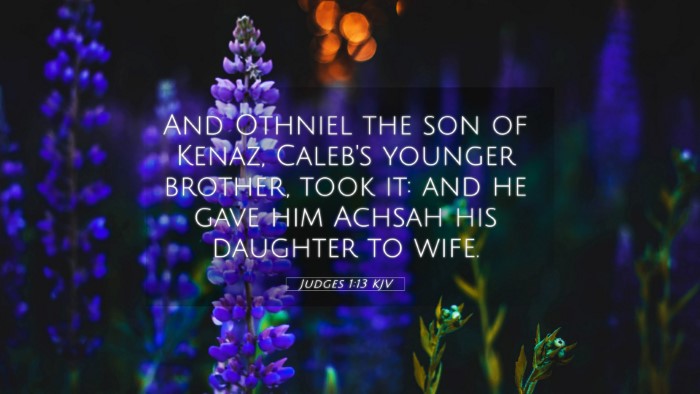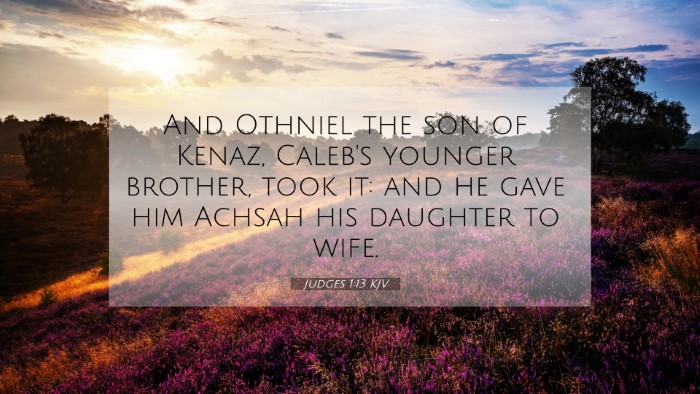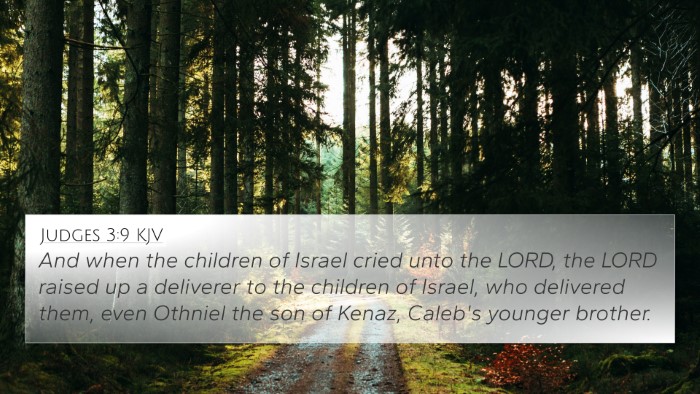Understanding Judges 1:13
Judges 1:13 states: “And Othniel the son of Kenaz, Caleb’s younger brother, took it: and he gave him Achsah his daughter to wife.” This verse marks a significant moment in the Book of Judges, showcasing themes of conquest, reward, and familial loyalty.
Summary of Key Themes
- Conquest and Victory: Othniel's success in capturing the city signifies the fulfillment of God’s promise to the Israelites.
- Divine Favor: His victory is seen as a reward from God for faithfulness and courage.
- Marriage as a Reward: The giving of Achsah reflects the merging of family and tribal lines, and highlights the social structures of the time.
Bible Verse Cross-References
This verse connects to several other scriptures that deepen our understanding:
- Joshua 15:17: This verse discusses how Caleb promised his daughter in marriage to whoever conquered Kiriath-sepher, which highlights the continuity of Caleb’s family legacy.
- Judges 1:12: Discusses the inheritance of Caleb and sets the stage for Othniel’s actions.
- 1 Chronicles 4:13-15: Provides additional genealogical context regarding Othniel and his family.
- Romans 8:37: Relates to the victorious life promised to believers, akin to Othniel’s conquest.
- 1 John 5:4-5: Discusses overcoming the world which parallels the spiritual victories seen in Judges.
- Hebrews 11:32-34: Mentions the faith of judges, including Othniel, as part of the hall of faith.
- Revelation 3:21: The theme of receiving reward for overcoming reflects the honor given to Othniel.
In-Depth Commentary Insights
Drawing from various public domain commentaries:
- Matthew Henry: He emphasizes the importance of Othniel as the first judge, highlighting his role as a leader raised by God amid Israel's disobedience. Othniel's marriage symbolizes the intertwining of divine favor in personal and communal victory.
- Albert Barnes: Barnes points out the significance of the name “Achsah,” which means “anklet” or “adornment,” suggesting that her relationship with Othniel became a treasured connection within Israel’s lineage.
- Adam Clarke: He offers insights into the tribal implications, noting the strategic alliance formed through this marriage as vital for Israel's stability and success in the ensuing battles.
Connections Between Bible Verses
The narrative encapsulated in Judges 1:13 exhibits thematic connections throughout the Scriptures. These connections are vital for understanding how individual stories relate to the broader tapestry of God’s redemptive plan:
- Family and Leadership: This theme resonates with narratives in Genesis, such as Jacob’s blessings (Genesis 49), indicating the importance of lineage.
- Conquest and Divine Alignment: This theme can be traced through narratives of Israel’s conquests in Joshua, showing that earthly victories reflect heavenly realities.
- Covenantal Relationships: The marriage relationship here parallels the covenant God has with Israel, emphasizing fidelity and loyalty.
The Importance of Cross-Referencing
Utilizing tools for Bible cross-referencing can greatly enhance one's study of Scripture:
- Bible Concordance: Helps locate verses and themes throughout the Bible.
- Bible Cross-reference Guide: Provides insights into related verses that support deeper understanding.
- Cross-reference Bible Study: Encourages engagement with multiple passages that illuminate the same theme, fostering a richer comprehension.
- Comprehensive Bible Cross-reference Materials: Using a variety of resources allows for a more holistic approach to studying the Word of God.
Conclusion
The exploration of Judges 1:13 is a testament to how interconnected the Scripture is; it encourages the reader to dig deeper into the Word, utilizing cross-referencing Biblical texts to uncover layers of meaning. This verse illustrates God's providence, the interplay of human actions, and the importance of familial ties within the unfolding narrative of Israel’s history.



